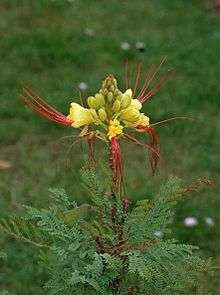Erythrostemon gilliesii
Erythrostemon gilliesii is a shrub in the legume family. It is commonly known as bird of paradise, but it is not related to the bird of paradise genus Strelitzia. It grows to 1–4 m tall, depending on rainfall. The leaves are bipinnate, 10–15 cm long, bearing 3-10 pairs of pinnae, each with 6-10 pairs of leaflets 5–6 mm long and 2–4 mm broad. The flowers are borne in racemes up to 20 cm long, each flower with five yellow petals with 10 long conspicuous red stamens. The pods are densely covered in short, red glandular hairs.
| Erythrostemon gilliesii | |
|---|---|
 | |
| Scientific classification | |
| Kingdom: | |
| (unranked): | |
| (unranked): | |
| (unranked): | |
| Order: | |
| Family: | |
| Genus: | |
| Species: | E. gilliesii |
| Binomial name | |
| Erythrostemon gilliesii (Hook. 1829) Klotzsch 1844 | |
| Synonyms | |
| |

It is a striking ornamental plant native to South America, mainly Argentina and Uruguay. It is naturalized in Texas, and fairly common in the rest of the southwestern United States, where it is known as bird of paradise bush, desert bird of paradise, yellow bird of paradise, and barba de chivo.
Although it is a tropical plant adapted to dry climate, it also thrives in the climate of Avsa and neighboring islands in the south of Sea of Marmara in northwestern Turkey, where it is commonly known as Paşabıyığı (Pasabiyigi), Cennetkuşu ağacı (Cennetkusu agaci), which in Turkish means "bird of paradise tree," and Bodurakasya, which means "dwarf acacia". This species is also fairly common in the Karoo of South Africa.
Medicinal uses
Medicine men of peoples indigenous to the Amazon Rainforest used this plant and the similar Caesalpinia pulcherrima, which they called ayoowiri, for curing fever, sores, and cough. Four grams from the root is also said to induce abortion in the first trimester of pregnancy.[1] However, the seeds and the green seed pods of this plant are toxic, provoking severe vomiting and other abdominal symptoms.
References
- S. Allen Counter (2006-07-24). "Amazon mystery: A medicine man understood the secrets of this plant long before we did. How?". The Boston Globe.
- Weeds of California and Other Western States, Vol. 1, University of California, Agriculture and Natural Resources, Publication 3488, ISBN 978-1-879906-69-3, ISBN 1-879906-69-4
External links
| Wikimedia Commons has media related to Caesalpinia gilliesii. |